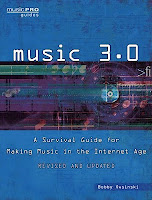------------------
"The industry has been slow to develop a new generation of artists, instead relying on so-called “heritage” artists like The Eagles and Madonna for large sales numbers. Since grunge was the biggest genre trend in the past 20 years or so (musical trends used to come every 6 to 13 years), it can be said that the industry is long overdue for something new. But with less artist development than ever before, when will this happen?
Artist development has always been the lifeblood of the industry, even as far back as M1.0. A good example of this is Geffen Records (now owned by the Universal Music Group). To build his label, David Geffen signed three of the biggest stars in the world at the time (1980): Donna Summer, Elton John, and John Lennon. Donna Summers’s and Elton John’s first albums for Geffen stiffed outright. While John Lennon’s was also headed for the dumper, he was unfortunately killed, which caused his entire catalog’s sales to spike. It wasn’t until the label signed new acts that it truly became successful, with Whitesnake and Guns N' Roses leading the way. As always, if you want to get rich in the music business, you’ve got to invest in the new.
The nature of artist development has changed through the years, going from being one of patience to that of instant win or lose for the artist. In the music business’s so-called glory days of the late ’60s and ’70s, it was not uncommon for a record label to stay with an artist for three, four, or even five albums (as was the case with mega-stars David Bowie, Fleetwood Mac and Tom Petty) as the artist built an audience and eventually broke into the mainstream music consciousness. This is because the most successful labels like Warner Bros., Atlantic, and Elektra were run by music visionaries instead of large corporations worried about their quarterly bottom line. As the conglomerates gradually took over the major labels, that patience grew less and less until it reached today’s “the first record must be a hit or you’re dropped” mentality. Luckily, M3.0 finally provides an alternative to this way of thinking within the corporate music industry.
The Death Of A&R
The job of A&R isn't what it used to be, and looks to be dying even faster than the major record labels. According to former Arista Records A&R man Rich Esra, one of the publishers of The Music Business Registry, a quarterly publication that tracks A&R people and provides their contact information, there were only 25 A&R execs hired in 2010 while 40 were let go without a single one of them being rehired. In 2009 there were 58 hired and 51 laid off, and in 2008 there were 80 hired and 64 terminated. Notice a trend?
Rich recently posted the reasons that he thought A&R was dying in the excellent Digital Music News newsletter. According to Rich:
"1) The major labels are hiring fewer and fewer A&R executives because the volume of acts (and more importantly the types of acts) being signed have dramatically decreased.We've all heard the stories about the meddling A&R guy who knows nothing yet demands that an artist change their music or direction for reasons known only to him, but the fact of the matter is that there were far more good A&R people employed than bad ones. Someone has to find the next generation of talent just to keep these companies alive, and without A&R, it's more likely than ever that the major labels will die along with the position."
2) The A&R process used to be about the discovery, signing and nurturing of the act. Today, A&R executives are not looking for talent per se. They are looking for an ongoing business.
An artist that has developed some kind of traction and awareness on their own is what I'm talking about. Today, acts need to be "developed" or at least be developing in a business sense, for any label to have even the slightest amount of interest. The idea that today's A&R executives will discover an unknown act/artist and develop that artist is an illusion. They have neither the desire, time or money, for that matter, in 2011.
(3) This is why from an A&R perspective, only the most generic, ubiquitous type of acts get any attention from labels today. There is only a certain type of act these days that major labels are willing to sign."
You can read additional excerpts from this and my other books on the excerpts section of my website.


1 comment:
Very cool read I will put it to use as I try to introduce the world to ELIZA NEALS thanks xxoo
messinwithafool.com
Post a Comment